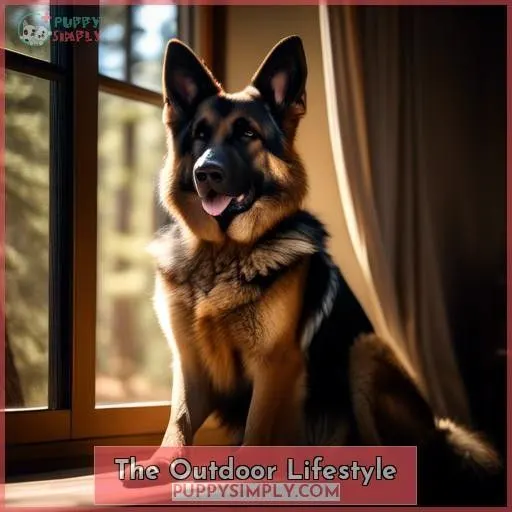This site is supported by our readers. We may earn a commission, at no cost to you, if you purchase through links.
Yes, German shepherds can absolutely thrive as indoor dogs when their needs are properly met. As highly intelligent and loyal companions, they cherish being part of the family and do well in home environments. While they are adaptable to the outdoors, German shepherds are better suited for an indoor lifestyle that provides the warmth, security, and stimulation they crave.
With proper training, socialization, and regular exercise, you can enjoy a German shepherd as an adored indoor housemate. To learn more about optimizing their indoor experience and addressing any destructive behaviors, keep reading.
Table Of Contents
Key Takeaways
- German Shepherds can thrive indoors when their physical and mental needs are met, including regular exercise and socialization.
- These intelligent and loyal dogs benefit from being part of the family environment, which aligns with their pack mentality.
- It’s important to provide a comfortable indoor space with temperature regulation and a crate or dog bed for safety and tranquility.
- Addressing destructive behaviors in German Shepherds requires identifying the cause and ensuring they receive sufficient exercise, mental stimulation, and proper training.
Can a German Shepherd Be an Inside Dog?
Yes, a German Shepherd can be an inside dog. They should spend most of their time indoors, especially if their owners are home, as they need to be around their family to learn how to interact with them and get the necessary socialization.
With proper care and training, German Shepherds can thrive in apartment settings, provided they get enough mental and physical exercise.
Do German Shepherds Need to Be Inside?
German Shepherds thrive indoors, where they can satisfy their pack mentality and feel part of the family.
Health concerns and behavioral issues are minimized when your German Shepherd’s exercise requirements and socialization needs are met at home.
Breed characteristics make them ideal housemates—intelligent, loyal, and anxious to please.
Keeping your dog inside guarantees they’re not just another home accessory but a cherished member of your inner circle, contributing to a harmonious household.
Can They Be Left Outdoors?
German Shepherds are renowned for their intelligence, energy, and loyalty, but they also necessitate distinct arrangements for their living situations. While they’re adaptable to outdoor conditions, they’re typically more appropriate for indoor environments. Here are the reasons:
- Temperature Regulation: German Shepherds are susceptible to extreme temperatures. During cold weather, they may struggle to effectively regulate their body temperature, potentially leading to health concerns. In hot weather, they risk heat exhaustion if not provided with sufficient shade and hydration.
- Insect Bites: Outdoor living exposes German Shepherds to insect bites, which can cause discomfort and potential hazards, particularly if the dog has an allergy to insect bites.
- Theft and Escape: German Shepherds are frequently targeted for theft due to their perceived value and the belief that they provide home protection. Leaving them outdoors may increase their likelihood of escaping, elevating the risk of accidents or injuries.
- Boredom: German Shepherds are highly intelligent and active dogs. If left outdoors without adequate stimulation, they may experience boredom and engage in destructive behaviors, potentially causing property damage or self-harm.
- Crate Training: While crate training can be advantageous for housebreaking and providing a secure space for the dog, it isn’t advisable for puppies under six months of age. Puppies require indoor environments for proper socialization, bonding, and crate training.
The Indoor Lifestyle
As a conscientious and knowledgeable German Shepherd owner, you comprehend the significance of providing your canine companion with a comfortable and secure living space. The indoor lifestyle is the most appropriate for these discerning dogs, who flourish on companionship and engagement with their human family. Here are some essential considerations for safeguarding your German Shepherd’s well-being indoors:
- Crate Training: Crate training is advisable for German Shepherds, especially for puppies, to provide a sanctuary of safety and tranquility. Select the appropriate crate size and furnish it with cozy padding and blankets. If you prefer not to use a crate, provide an elevated dog bed instead.
- Puppy Development: Puppies require bonding time with their family and regular training sessions to establish boundaries. Instruct them in basic commands such as sit, stay, and come, and respond to their name or other cues. Consistency in training sessions is paramount.
- Nighttime Routine: German Shepherds can experience coldness at night, particularly during the winter months. Guarantee that they’ve a warm and dry place to rest, ideally between 68-75 degrees Fahrenheit (20-24 degrees Celsius).
- Temperature Regulation: Maintaining suitable temperatures is imperative for your dog’s health and well-being. Indoor temperatures shouldn’t descend below 45°F for more than 4 consecutive hours, and all other dogs must have some means of retaining body heat if the temperature is below 50°F.
- Socialization: German Shepherds are pack animals and require inclusion in family activities. Regular exercise and socialization are vital for their mental stimulation and overall well-being.
The Outdoor Lifestyle
Moving from the comfortable indoors, let’s explore the backyard. While the Kennel Club acknowledges the flexibility of German Shepherds, it’s not a permission slip for full-time outdoor living. These dogs, bred for both companionship and working roles, desire interaction and exercise.
A responsible breeder will emphasize the significance of aligning exercise levels with their need for family time. So, before you consider an outside arrangement, remember, a happy German Shepherd is one that balances outdoor adventures with indoor belonging and safety.
Addressing Destructive Behavior in German Shepherds
Addressing destructive behavior in your German Shepherd is essential for maintaining a harmonious and secure environment. Destructive behaviors often originate from unsatisfied needs, which can be addressed through training, exercise, and mental stimulation. Here are some steps you can take to help your German Shepherd overcome destructive tendencies:
- Identify the cause: Determine what’s causing your dog’s destructive behavior. Common reasons include boredom, lack of exercise, inadequate mental stimulation, teething, stress, illness, or separation anxiety.
- Meet their needs: Make sure your dog receives the appropriate type of exercise, such as daily walks and playtime, and provide them with ample mental stimulation through activities like puzzle toys, scent games, and training sessions.
- Address underlying issues: If your dog is destructive due to stress, illness, or separation anxiety, consult with a veterinarian or professional dog trainer to address these issues.
- Train your dog: Teach your dog appropriate behaviors through positive reinforcement training. Reward your dog for good behavior and avoid punishing them for destructive actions, as this can confuse them and worsen the issue.
- Consider professional help: If your dog’s destructive behavior persists despite your efforts, consider seeking assistance from a professional dog trainer or behaviorist. They can provide you with personalized guidance and strategies to address your dog’s specific needs.
Frequently Asked Questions (FAQs)
How often should a German Shepherd be taken outside for exercise?
You should take your German Shepherd outside for vigorous exercise at least 1-2 hours daily. This high-energy breed thrives on an active lifestyle and regular playtime to stay healthy and well-behaved.
Can German Shepherds live in apartments?
Can German Shepherds thrive in apartments? You bet they can! With their adaptable nature and proper exercise, these loyal pups can make cozy apartment dwellers. Just don’t forget to give ’em that energetic playtime, pal.
What are the ideal sleeping arrangements for a German Shepherd?
You’ll want to crate train your German Shepherd pup, as this gives them a cozy, calming space. As they mature, you can switch them to sleeping on their own bed near your bedroom for a sense of security and belonging.
How can I address destructive behavior in my German Shepherd?
To curb destructive behaviors in your German Shepherd, make sure they’re getting ample exercise, mental stimulation, and quality time with the family. Proper training and meeting their needs will nip those pesky habits in the bud.
Is crate training necessary for a German Shepherd puppy?
Crate training is highly recommended for German Shepherd puppies. It provides a safe, calming space and supports potty training – a win-win for you and your furry friend. Get that pup set up for success from the start!
Conclusion
Ultimately, a German shepherd can thrive as an inside dog when their needs are adequately addressed. By providing ample exercise, mental stimulation, and a secure home environment, the dog can remain a happy, well-behaved indoor companion.
Just look at Jane, who’s had her German shepherd Buddy living indoors for the past 5 years. So with the right preparation, a German shepherd can absolutely be an inside dog and enjoy a fulfilling life as part of the family.












